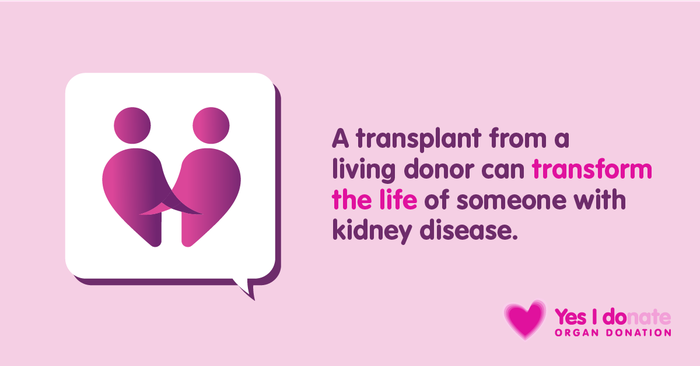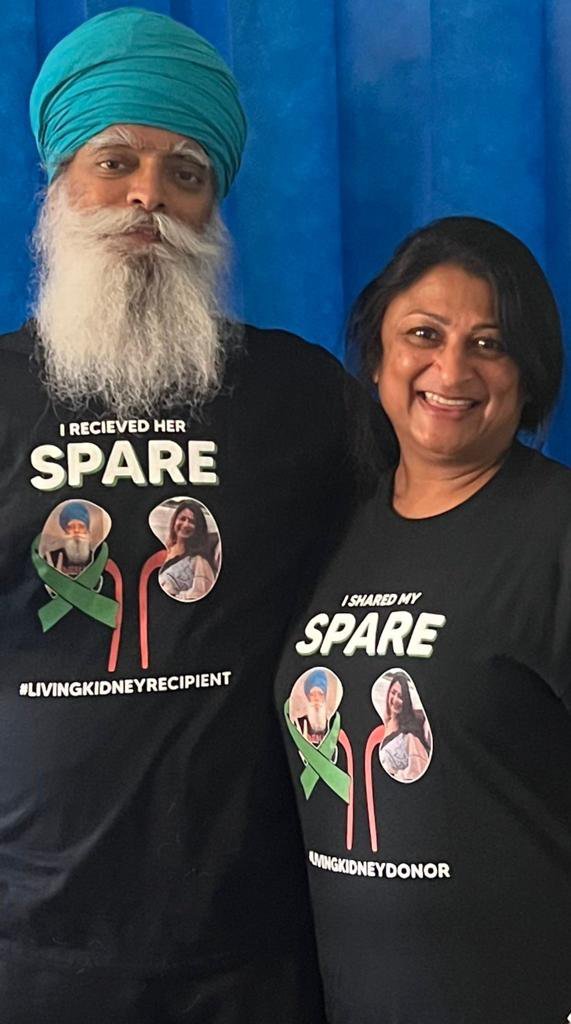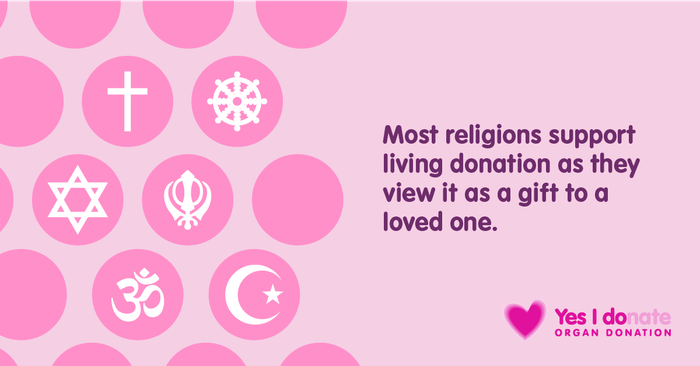"I'm Ravi Singh, CEO of the charity Khalsa Aid and, as of a few weeks ago, also a kidney recipient."
"My kidney function began to deteriorate around 2017. It was quite rapid. Just like anything in life, when other people have something, you see it as a passer by. When you have it, then it affects everyone around you as well – your family and yourself. And you start having a lot of negative thoughts, thinking what will happen now, what's the next step? It was a big shock. But I'm not the type of guy to let anything get me down.
"I wanted to keep cheery for everyone around me, so my family wouldn't think 'oh my God, he's in bed all day, he's depressed'. People who have not gone through it will find it hard to understand, but your body feels like you've been battered. It's so tiring, such fatigue sets in, that honestly you just want to give up. But you can't give up! There are good doctors waiting for you, and you've got to carry on, for yourself and your family and for your mental health. My advice to anyone would be to keep your mind and your body busy. Learn about what you're going through and face it. If you have any questions, ask your doctors. Don't lock everyone out. It's not all doom and gloom. A lot of people have kidney transplants and successfully live on.
"I went on to peritoneal dialysis at home for one and a half years and initially it was fine. At home, you're in your own surroundings, you're in comfort, you're with your family, you're going to have a cup of tea while you're doing it. But no matter how tired you are, how frustrated you are, whatever the situation personally, you've got to do your dialysis session. That's where it gets frustrating. Sometimes you come home late. It's winter, everyone's gone to bed. You're standing there in your small room, looking at the walls, or going through your phone, or listening to something, and you're on your own. But you have to remember – dialysis is keeping you alive."

"I was on the transplant list, waiting, hoping, that a deceased donor might give me a kidney"
"Being a Sikh, I posted on my social media, which has a large following, that I had kidney failure. Around the globe, maybe 1500-2000 people volunteered to give me their kidney! All different faiths came forward, not just Sikhs.
"I don't think any faith says that if you have a medical condition you should simply give up because God doesn't want you to have treatment. It's not just you suffering and passing away from lack of medical treatment, it's you then taking your whole family with you.
"We need to get over cultural taboos about organ donation. Christianity, Islam, Sikhism, Hinduism – in every faith we talk about humanity. There is no bigger act of humanity than donors giving their organs to someone to save their life. And there's no bigger act of humanity than accepting the organ because that somebody is giving you a chance to live again. To receive the gift of an organ is an absolute honour. Whoever gives you a kidney becomes like your second mother or father, in a way, because they're giving you life.
"I was given this gift by Daksha Varsani, who had worked with my wife in our charity office during the 2015 Nepal earthquake, when I was coordinating aid in Nepal. She found out on social media that I needed a kidney. She voluntarily went to Hammersmith Hospital and offered to donate a kidney, and started the process of all the check-ups that you need and all the blood tests that you need and the fitness tests that you need. And we matched."

"After the transplant we were in the same ward. I remember I got up at 3am the day after the operation and at about 8am she woke up, I could hear her talking to me from the second bed up. And then I started feeling guilty. I had put this woman through so much because of my need for a kidney, to live. And the next day she walked over to me, and there weren't any words, she just broke down. I was overcome, and I don't think words would have been any good in that moment. It still hasn't sunk in that there's someone out there who went through so much pain for me. I do humanitarian work, and that's the greatest act of humanity I've seen in 23 years of frontline aid work. Daksha as become part of our family now. All my family want to meet her, so they can really thank her as well."
"My message to people on dialysis, especially those who are just about to start, or have just started, is that nobody wants to be in that place in their life. I didn't want to be in that place. But this is what's best for you at the moment. Listen to the advice and take it head on, there's nothing to be negative about. You learn so much because as you're going through it you become like an encyclopaedia of treatment, and you can actually help others. Because we don't realise until it happens to us how common kidney disease is. Support charities like Kidney Care UK, who are helping people around this country to realise what they are entitled to, and what they should be getting help-wise. And don’t just give money, get involved!
"Miracles are happening in hospitals. Those miracles are donors giving their organs to someone to allow them to live, tens of thousands of times throughout the year, and recipients receiving them and living on. If you've gone through a transplant, you've had kidney disease, you're on PD dialysis or any dialysis, put it on social media, tell people how important it is to donate organs. Whether a living donor or a deceased donor, you're going to save a life. We talk about religious miracles, but these are the real miracles that we don't talk about. These are the greatest miracles of humanity and yet we are very silent. Tell the world: this is what happened to me. Be loud."

"I think organ donation is one of the most special things that people can do in their lives."
Frank Dor is the transplant surgeon who operated on both Ravi and Daksha.
“It's a big honour to operate on a living donor because that person is healthy and should remain healthy. Everything has to be perfect so it's quite a big responsibility. And even though I've done it a lot of times, every single time I still feel that responsibility. And I think in surgery that is really unique, because there is no other operation with this nature.
“We get to know our donors and also our recipients way before the actual transplant, during their workup. And sometimes you have to meet them several times in order to get them ready for a transplant. So I always get to know all my patients quite well. That makes it special, if you actually know the people and know what they're doing in life and know a little bit about their personal circumstances, like I did with Ravi and Daksha. It feels much more than just doing an operation.
“I think organ donation is one of the most special things that people can do in their lives. Compared to many other types of surgery, the biggest life changes come from organ donation. It's the most powerful thing to do, one of the most beautiful things, after childbirth I think, that I have seen and witnessed in my career and in my life. So we should celebrate the power and the opportunity that organ donation gives.”
Lives can be saved and transformed by organ donation
- Organ donation is the gift of an organ to help someone who needs a transplant. Thousands of lives in the UK are saved or transformed each year by organ transplants.
- Every day in the UK, someone dies waiting for an organ transplant, because there just aren’t enough organ donors.
- There are currently more than 7000 people waiting for an organ transplant in the UK, and while more people from Black, Asian and minority ethnic backgrounds are receiving transplants than ever before, Black and Asian patients still wait longer than White patients for a transplant. People can receive a transplant from someone of any ethnicity, however the most suitable match is likely to come from a donor of the same ethnicity.
- You are more likely to need a transplant yourself than you are to become an organ donor because only 1% of people who die do so in a way that allows organ donation to take place.
- A living donor is someone who has agreed to donate their kidney to you while they are still alive. On average, approximately 30 out of 100 kidney transplants are from living donors. Find out more about living donor kidney transplantation.
Please think about what you would like to happen to your organs when you die and take a few minutes to register your decision and let your loved ones know. Information about organ donation is available on the NHS Blood & Transplant website.